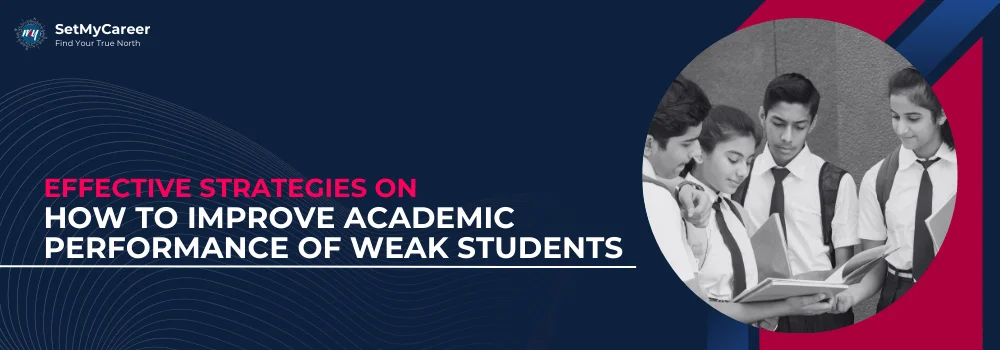Published by Jyothi Patil on 22 January 2025
Content Strategist | Editorial Team Member
Jyothi Patil is a skilled writer with a strong background in English literature, which she applies to crafting engaging content across various platforms. From writing blogs for her website and guest posts to creating pieces on Medium and Substack, Jyothi excels in making complex ideas easy to understand.
Proven strategies on how to improve academic performance of weak students and help them build confidence.

Not every student finds learning easy, and that’s okay! Some struggle with tricky concepts, lose focus quickly or just don’t know how to study effectively. But here’s the good news—academic performance isn’t set in stone! With the right strategies, even the weakest students can improve, gain confidence, and perform better in school. Whether it’s smarter study habits, personalized learning, or a little motivation, small steps can make a big difference. In this blog, we’ll explore practical and effective strategies on how to improve academic performance of weak students and help them turn their struggles into success.
Before diving into solutions, it’s crucial to understand why some students struggle with academics. Weak academic performance isn’t just about a lack of effort—it often stems from deeper issues. To truly help, we need an action plan for slow learners that addresses these underlying challenges. Some common reasons include:
Learning Disabilities: Conditions like dyslexia, ADHD, or processing disorders can make understanding concepts difficult.
Lack of Interest or Motivation: When subjects feel boring or irrelevant, students lose focus and stop engaging.
Poor Study Techniques: Many students don’t know how to study effectively, leading to wasted effort with minimal results.
Personal or Family Issues: Stress at home, financial problems, or emotional struggles can impact concentration.
Low Self-Confidence: When students believe they are "not smart," they stop trying altogether.
Distractions & Poor Time Management: Social media, gaming, and lack of structure make it hard to focus on academics.
Understanding the cause behind poor performance helps teachers, parents, and students apply the right strategies to overcome these challenges.

Success isn’t about studying more, but studying right—here’s how
Level UpImproving academic performance doesn’t mean studying for endless hours—it’s about using smarter techniques that make learning easier and more effective. Here are some key strategies that can help weak students improve:
Every student learns differently. Instead of a "one-size-fits-all" approach, adopting personalized learning can help weak students grasp concepts better. This includes:
Identifying their learning style – Visual, auditory, or hands-on learning
Adapting teaching methods – Using videos, storytelling, or experiments
Providing extra attention – One-on-one mentoring or tutoring
Many students get overwhelmed by large academic tasks. Breaking them into smaller, achievable goals makes learning more manageable. Here’s how:
Set daily and weekly study goals – Example: “Finish two science chapters this week.”
Use planners or study schedules – Helps with time management.
Prioritize subjects – Focus more on weaker areas first.
Small wins build confidence, and over time, they lead to big improvements.
Weak students often struggle because they don’t know how and the best time to study. Teaching them the right methods can drastically improve their retention and understanding. Some effective techniques include:
The Pomodoro Technique: Study for 25 minutes, take a 5-minute break, and repeat to improve concentration.
Active recall: Instead of rereading notes, quiz yourself on key concepts.
Mind mapping: Use diagrams to connect ideas and improve memory.
Summarization: Write down key points in your own words—it helps in understanding better.
A messy or noisy study space can make it difficult for students on how to focus while studying. A dedicated, well-organized study environment can significantly enhance concentration and learning. Here’s how to create the perfect study setup:
Choose a quiet, well-lit area.
Keep phones and social media away.
Use soft background music or noise-canceling headphones.
Keep all study materials ready beforehand.
Many students hesitate to engage in class, making it harder for them to retain information. Active participation helps in better understanding and boosts confidence. Students should:
Ask questions – Curiosity leads to better understanding.
Take notes – Writing things down improves retention.
Participate in discussions – Explaining concepts to others reinforces learning.
It’s okay to ask for help! Many weak students struggle because they are afraid to seek guidance. Encouraging students to:
Approach teachers for extra explanations.
Join study groups to learn with peers.
Seek professional tutors for subjects they find difficult.
A student’s brain needs breaks! The importance of extracurricular activities helps in reducing stress, improving focus, and boosting confidence. Activities like:
Sports
Arts & crafts
Music & Dance
provide a healthy balance between academics and personal growth. A refreshed mind learns better!
Improving academic performance isn’t about studying harder—it’s about studying smarter. With the right strategies, support, and motivation, every student has the potential to excel. Small changes in study habits, how to manage your time as a student, and learning approaches can transform struggles into success.
Need personalized guidance? SetMyCareer is here to help! Connect with our experts for academic and career counselling and guidance that’s personalized to your needs.
No. 14/595, 1st Floor, Nanjappa Reddy Layout, Koramangala 8th Block, Bangalore 560095